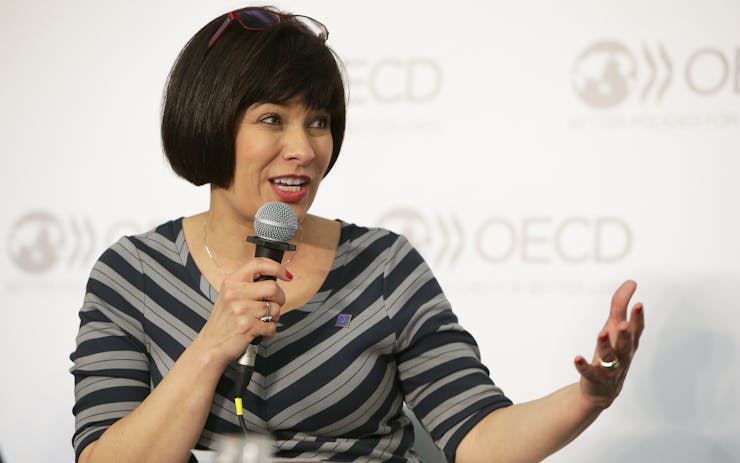Why don’t you just decriminalize it already? As Canada preps for the July 2018 legalization of adult-use recreational cannabis, that’s the message the federal government has been getting from the opposing New Democratic Party as well as cannabis advocates across the country.
The longstanding call for decriminalization may soon land upon more sympathetic ears. The government is shuffling out physician Jane Philpott from her position of Minister of Health (a role she held since the Liberal federal election in 2015), and replacing her with Ginette Petitpas Taylor, a member of the party’s caucus who was also first elected in 2015.
If the new Health Minister wanted to immediately decriminalize cannabis, it would very much be in her power to order so.
Before becoming a politician, Petitpas Taylor was a coordinator of the Victim Services Program at a small-town New Brunswick RCMP detachment, but it appears she has little experience in the fields of health or cannabis. After the announcement of her appointment, Petitpas Taylor was asked about her beliefs on marijuana legalization by CBC News. In response, she said she still needed to be briefed on the matter. (She also admitted having smoked cannabis a few times in college, “and that was it.”)
We have no indication that Petitpas Taylor will go against Justin Trudeau’s negative comments on immediate decriminalization, which he says would embolden the black market. In addition, the bureaucrats that worked at Health Canada in the past will almost certainly remain there, and they actually wield more control of the process than one might think.
Still, it’s fun to at least ponder the federal government decriminalizing personal use of marijuana, and how such a scenario would play out.
If the new Health Minister wanted to immediately decriminalize cannabis, it would very much be in her power to order so. Section 60 of Canada’s Controlled Drugs and Substances allows the Health Minister, through the governor in council, to order the addition or removal of drugs from the Act’s drug schedules as they see fit.
This mechanism sprang into action in 2015, when the health minister of the ruling Conservative party added salvia, a highly psychoactive but short-lasting mint, as a substance to the drug schedules. The Health Minister could theoretically issue such an order for a schedule change for cannabis, making its simple possession decriminalized effective immediate.
One complication of “decriminalization” is that the term has a variety of meanings. Recently, news outlets across the world reported that Oregon was “decriminalizing” small amounts of hard drugs such as heroin. In reality, the state changed some drug-related penalties from felonies to misdemeanors. (Still a good move, no doubt.)
Under decriminalization, current illicit dispensaries would still feel the long hand of the law, since trafficking offences would remain.
This most common form of “decriminalization” can be found sprouting up in states across the USA, with some states implementing civil fines for possession of small amounts of cannabis, replacing the criminal charges that stood before. Some jurisdictions have done away with any punishments, and other states like Colorado, Washington, California, and Oregon have gone past decriminalization and actually legalized a vibrant recreational marijuana sales market.
Still, most Canadian advocates adhere to the notion of decriminalization found in a 2016 motion by NDP Member of Parliament Murray Rankin, which sought to decriminalize only the possession of small amounts of cannabis, as opposed to altering the current criminal sanctions around cultivating cannabis.
Shop highly rated dispensaries near you
Showing you dispensaries nearFor Canadian decriminalization, a personal limit of 30 grams seems about the right place to peg it. That’s the limit proposed in Canada’s upcoming legalization bill for public possession, and that figure has long been a part of the Controlled Drugs and Substances Act as a limit that restricts the maximum punishment available to prosecutors (possession of over 30 grams is treated more harshly).
What would immediate decriminalization look like for Canadians and the grey-market dispensaries that are currently sprouting up across Canada?
If Canada adopted decriminalization, it’s possible that anyone found in possession of a small amount of cannabis would get off scot-free (or at most get slapped with a ticket). It’s likely that that the offences of trafficking and possession for the purpose of trafficking would remain, no matter how little cannabis is found on a person. That means that any indicators of trafficking such as scales or baggies would still land the individual with a charge even if they possessed a small amount.
Under decriminalization, current illicit dispensaries would still feel the long hand of the law, since trafficking offences would remain. The raids being conducted now on dispensaries would continue.
Even the federal Cannabis Act—which will legalize recreational adult-use cannabis in mid-2018—will continue to outlaw the possession or distribution of “illicit cannabis,” defined as marijuana that was neither grown legally by an individual nor sold through a provincially-authorized retailer.
Is decriminalization going to happen in Canada? It’s becoming a popular approach, and to the new Health Minister, we only have two words: Your move.





